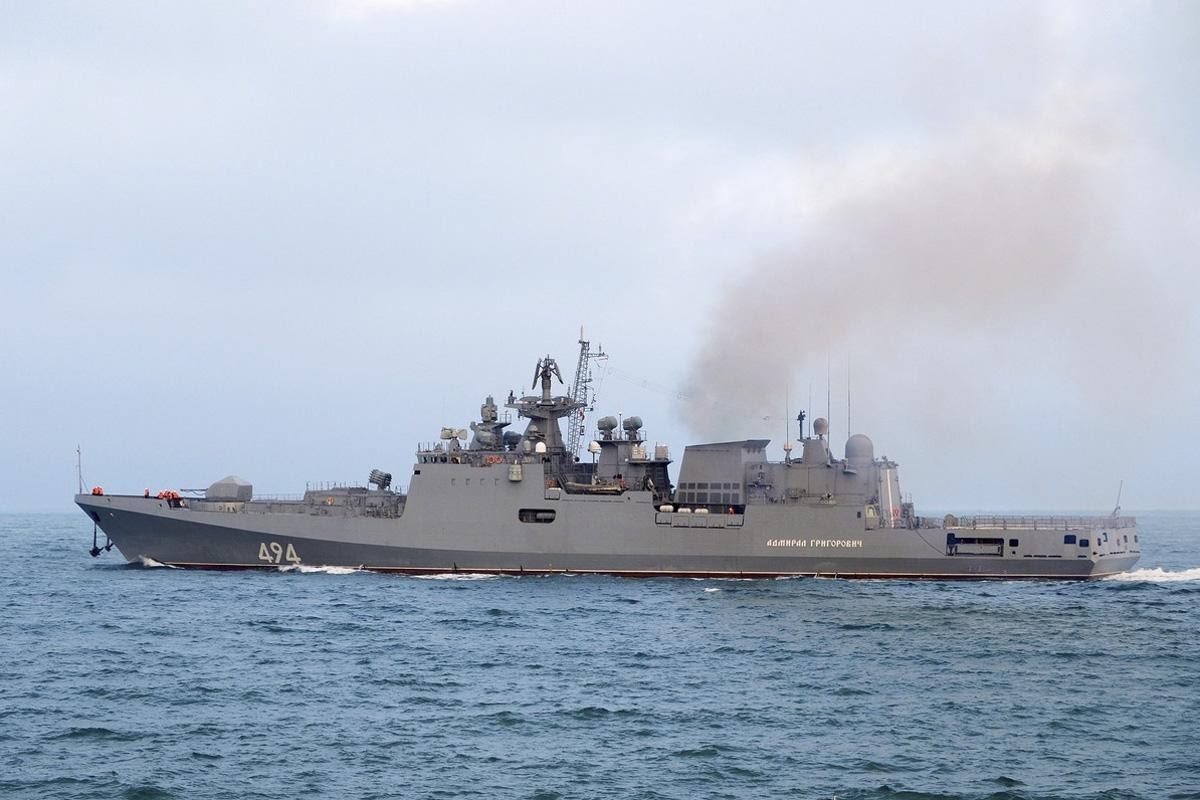Russia’s Black Sea Fleet was once the pride of the country, its origins dating back to Catherine the Great. After nine days of explosions around naval bases on the Crimean Peninsula this month, and the likely sacking of Igor Osipov, the Russian commander of the Black Sea fleet, humiliations continue to plague Russian forces. Before Victor Sokolov was cited by Russia’s RIA News Service as the new chief, Ukraine already had struck the ship “Moskva” in April using Neptune cruise missiles. It caused the warship to catch fire and the lead vessel sunk. Satellite imagery from last week indicates that eight Russian warplanes were destroyed by explosions. This week on Tuesday, Russian lost an ammunition depot in Crimea to explosions. Putin is faced with a number of challenges. One, in particular, is important and becoming more urgent this summer. Russia must find a way to build new, blue water–capable ships.
Since Putin’s “Special Military Operation” started in February, the Russian fleet has blockaded Ukraine’s Black Sea ports, denying passage to Kyiv’s grain carry ships. Ukraine’s fleet in comparison, however, is small and considered less capable of challenging Moscow’s ships. Commander Sokolov, who is 60 years old, is a seasoned officer having commanded minesweepers in the 1980’s- 1990’s and served as deputy commander of the Northern Fleets. Two years ago, he took over a head of an important military commander. Questions remain whether he can salvage the damage to the Russian position.
“When President Vladimir Putin signed Russia’s new naval doctrine on July 31, most commentators, both in Moscow and abroad, focused on his ambitious plans for Russia’s blue water navy and especially its expansion into the Arctic. One aspect of the new doctrine, however—its elevation of the Russian naval presence in the Caspian—has received far less attention; but it may ultimately be more important,” according to Paul Goble of the Jamestown Foundation. He argues that this conclusion reflects the difficulties Moscow faces in building the ships it needs for an expanded ocean-going presence. Those difficulties may make it hard for Russia to meet its naval ship-building plans.
Add to this challenge one issue that few media have covered. Putin’s perspective is that Russia is facing serious challenges in its littoral states. The Russian leader considers the environment so serious that he authorized the Caspian Flotilla to take over a central role in responding to them. According to a July 31, 3,000-word statement from Kremlin.ru that updates naval doctrine, the Kremlin document serves more as an aspirational document than a military plan of action. If Russia can upgrade its navy, it is most likely to be transformed with the Caspian Flotilla. This is a change in policy direction from three earlier versions of the doctrine put out by Putin. “This represents a significant upgrade of its status from Soviet times when the Caspian was effectively a Russian lake as Moscow controlled almost all the territory around it, and Iran, the only other littoral country, did not have a significant naval presence,” notes Goble.
Unlike earlier documents the new version makes no delineation between the level of quality of the Caspian units and others in the Russian fleet. It comes at a time all five littoral states, including Azerbaijan, Kazakhstan, Turkmenistan, Iran have expanded their Caspian naval presence. Russia is determined to retain its sphere of influence in the region, despite advances by the other navies. Iran and Azerbaijan are of particular concern to Putin due to their rapid development.
The new doctrine specifies that this force is responsible for one of “the vitally important regions (zones)” of the world’s water surface as far as Russian national interests are concerned. To that end, Goble says, the doctrine calls for the expansion of cooperation with other littoral states on a wide variety of issues, including the protection of the environment, as well as the modernization and development of the Caspian Flotilla and its basing.
The doctrine points out that Moscow can lead “the development of international military cooperation with the naval forces of the states of the Caspian region.” By including this line, the Kremlin is effectively committing itself to an expansion of the Caspian Flotilla relative to the other naval forces there. Analysts suggest that Moscow is seriously alarmed by developments in the Caspian due to an increasingly hostile Kazakhstan and progressively independent-minded governments in Azerbaijan and Turkmenistan.
Control of the region also is important because of it contains key oil-rich portions of the seabed. Iran had not agreed to the delimitation of the seabed, where the oil and gas fields are located and its increased naval presence on the sea gives Moscow a certain amount of leverage over the other regional states. Moscow’s worries about instability in the contested territory have increased in recent months as Russia’s “peacekeeping” presence in Nagorno-Karabakh is being challenged by Baku, Yerevan and even the Armenians of Karabakh itself, according to Goble. Some Russian military analysts have suggested that Moscow should use the Caspian Flotilla to defend its forces in the disputed region to retain their dominant position. Goble concludes that “Any one of these factors could explain why Moscow has assigned a larger role to the Caspian Flotilla in its new naval doctrine. Taken together, they mean that this oft-neglected force now deserves to be tracked much more closely.” Add to this scenario, increasing Chinese involvement in the Central Asian states and the world could end up seeing another kinetic conflict in the coming years.
Daria Novak served in the U.S. State Dept.
